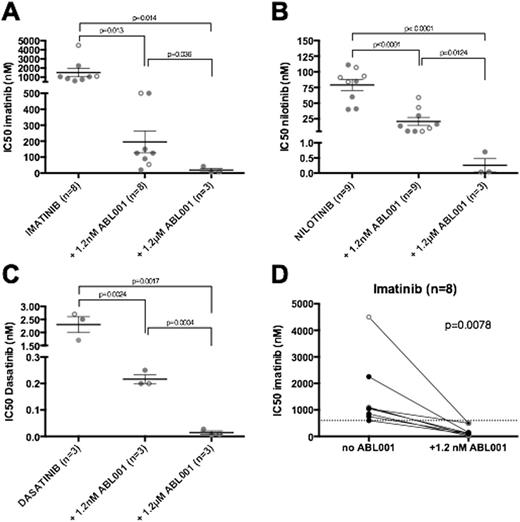Abstract

Background ABL001 (Novartis) is an allosteric inhibitor that binds to the myristate binding pocket of Abl to hold Bcr-Abl in the inactive conformation. A Phase I multicentre trial of ABL001 in chronic myeloid leukemia (CML) is ongoing (Protocol CABL001X2101), and includes testing ABL001 in combination with the ATP-competitive Tyrosine Kinase Inhibitors (TKIs) imatinib (IM), nilotinib (NIL) and dasatinib (DAS) to determine if simultaneous targeting of the myristate and ATP binding pockets provides greater pharmacological inhibition of Bcr-Abl and promotes greater reduction in tumor burden. In vitro sensitivity to TKIs can be measured by assessing the phosphorylation status of the Bcr-Abl substrate CrkL. Using this method, high IM in vitro sensitivity at diagnosis (IC50IM <0.6 µM; White et al, Blood 2005) is predictive of molecular response for patients treated with 600 mg IM.
Aim To investigate if the in vitro combination of ABL001 (at a pharmacologically-relevant concentration) with ATP-competitive inhibitors is more effective atBcr-Abl kinase blockade than IM, NIL or DAS as single agents.
Methods Blood mononuclear cells (MNC) were isolated with informed consent either prior to TKI therapy (n=6 de novo chronic phase CML patients) or at TKI-switch (n=4 resistant, intolerant or non-compliant patients). For in vitro sensitivity, MNC were treated for 2 h with a pre-determined range of concentrations of IM, NIL and DAS -/+ 1.2 µM ABL001 (based on human PK parameters from Novartis, average peak plasma concentration on 40 mg BID = 578 ng/mL or 1.24 µM) or a much lower dose of 1.2 nM; or with ABL001 alone. Phosphorylated-Crkl (p-Crkl) levels were determined by western blot and the IC50 was calculated by densitometry.
Results Kinase inhibition was markedly enhanced by addition of 1.2 µM ABL001 as compared to TKIs alone with mean IC50s without and with ABL001 of 1.52 µM ± 0.46 µM vs. 0.019 µM ± 0.012 µM (p=0.014), 79.1 nM ± 8.8 nM vs. 0.26 nM ± 0.22 nM (p<0.0001) and 2.3 nM ± 0.3 nM vs. 0.014 nM ± 0.007 nM (p=0.002) for IM, NIL and DAS respectively (Fig 1A-C). Since NIL and DAS IC50 values were reduced to picomolar levels in the presence of 1.2 µM ABL001 we then tested a 1000-fold lower ABL001 concentration of 1.2 nM. Similar results were obtained: the observed reductions in IC50s with 1.2 nM ABL001 were 86% (n=8, p=0.013), 72% (n=9, p<0.0001) and 90% (n=3, p=0.0024) for IM, NIL and DAS respectively (Fig 1A-D). In contrast, ABL001 alone was unable to completely inhibit phosphorylation of Crkl in 2 h, thus IC50 calculation was not possible. Collectively, 8 patients of various disease status were tested with IM and all had high IC50IM >0.6 µM, however, with the addition of just 1.2 nM ABL001, the IC50IM was reduced in all cases to <0.6 µM (Fig 1D, p=0.0078), a level that predicts excellent outcomes with IM therapy. The ABL001-induced reductions in TKI IC50s were of similar magnitudes in previously untreated patients as well as those switching TKIs for resistance or intolerance.
Conclusions These data suggest that (1) in vitro kinase inhibition achieved with ABL001 in combination with IM, NIL or DAS is greater than that achieved with TKIs alone, even at a concentration 1000-fold lower than achievable on the current ABL001 dosing regimen; and (2) patients with high IC50IM who would be predicted to respond poorly to 600 mg IM have dramatically increased kinase inhibition with the addition of just 1.2nM ABL001. These results suggest that simultaneous targeting of themyristate and ATP binding pockets ofBcr-Abl may be more effective than targeting either site alone and provides a strong rationale for combining IM and ABL001, particularly in patients with low intrinsic sensitivity to IM.
Addition of 1.2 nM or 1.2 µM ABL001 to ATP-competitive TKIs increases the degree of Bcr-Abl kinase inhibition achieved in vitro in CML mononuclear cells.Patient MNC were incubated for 2 h with (A) IM (B) NIL and (C) DAS + 1.2 nM (middle) or 1.2 µM (right) ABL001 and IC50 calculated by determining the concentration of TKI causing 50% reduction in p-CrkL. Solid dots represent diagnosis patients; open circles represent patients switching TKI for intolerance or resistance; Numbers are shown in parentheses; Black lines are means; error bars are SEM. The eight patients in (A) are shown in (D) paired with their response to 1.2 nM ABL001 (dotted line indicates the average IC50IM for 62 de novo CMLs in the TIDEL trial).
Addition of 1.2 nM or 1.2 µM ABL001 to ATP-competitive TKIs increases the degree of Bcr-Abl kinase inhibition achieved in vitro in CML mononuclear cells.Patient MNC were incubated for 2 h with (A) IM (B) NIL and (C) DAS + 1.2 nM (middle) or 1.2 µM (right) ABL001 and IC50 calculated by determining the concentration of TKI causing 50% reduction in p-CrkL. Solid dots represent diagnosis patients; open circles represent patients switching TKI for intolerance or resistance; Numbers are shown in parentheses; Black lines are means; error bars are SEM. The eight patients in (A) are shown in (D) paired with their response to 1.2 nM ABL001 (dotted line indicates the average IC50IM for 62 de novo CMLs in the TIDEL trial).
Yeung:Novartis Pharmaceuticals: Honoraria, Membership on an entity's Board of Directors or advisory committees, Research Funding; BMS: Honoraria, Membership on an entity's Board of Directors or advisory committees, Research Funding; Ariad: Research Funding. White:Bristol-Myers Squibb: Honoraria, Membership on an entity's Board of Directors or advisory committees, Research Funding; Ariad: Consultancy, Honoraria, Research Funding; Novartis Pharmaceuticals: Honoraria, Membership on an entity's Board of Directors or advisory committees, Research Funding. Hughes:Australasian Leukaemia and Lymphoma Group (ALLG): Other: Chair of the CML/MPN Disease Group; Bristol-Myers Squibb: Honoraria, Membership on an entity's Board of Directors or advisory committees, Research Funding; Novartis Pharmaceuticals: Honoraria, Membership on an entity's Board of Directors or advisory committees, Research Funding.
Author notes
Asterisk with author names denotes non-ASH members.

This icon denotes a clinically relevant abstract


